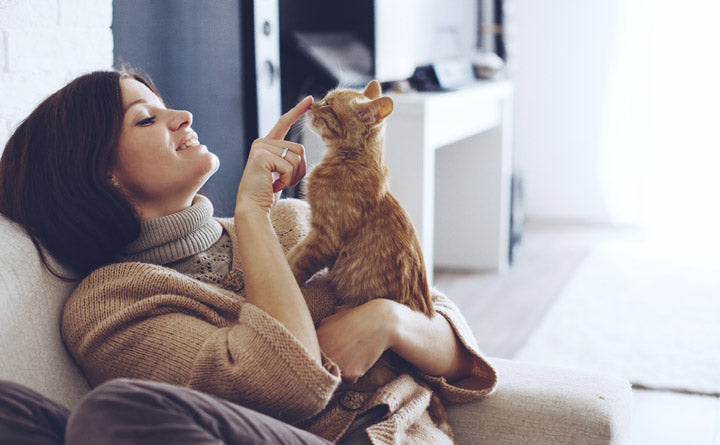If you’re a pet lover with cats or dogs, you already know how much work it is to maintain their health, safety, and happiness. But did you know that as a result of having pets, you also need to be responsible for additional upkeep to your cooling system?
According to the Humane Society of the United States, over 80 million homes in the U.S. have at least one pet. Homes with even just one pet will require significant extra maintenance, especially during the shedding seasons of the year.
Keep extra filters on hand.
You already know how much your pet sheds, and the problem can be worse in the spring and fall months. Pet hair and dander can clog your furnace’s filter. That’s right, air-conditioned air passes through your furnace filter during the cooling season.
What problems could a dirty filter cause?
A dirty air filter means compromised indoor air quality, and it can also cause inefficiencies with your air conditioner. Extra strain on the system could lead to premature wear and tear, or expensive breakdowns.
How often should I change my filter?
Change your filter at least once a month, perhaps more often if you have allergy sufferers in your home.
Keep an eye on your condenser.
The condenser is often installed outside your home. Dogs love to “mark” their territory, and this may include marking your condenser. Unfortunately, this habit could cause serious problems for the component, including rusting and damage to the parts of the unit. It’s not recommended to cover your air conditioner, so keep an eye on your pet(s) when they’re outside to be sure they don’t go near the box.
Hide any wiring that is visible to your pet.
If there is any wiring hanging out of your cooling system, be sure to put it out of reach. Your cat or dog may see wires as something they can play with. However, if they bite or scratch at the wires, it could injure or kill your pet and cause serious damage to your system.
Be sure that pet door is properly sealed.
If you have a pet door leading outside, be sure that it’s caulked around the edges. Pet doors are notorious for air loss. You don’t want cool air from your home seeping out. That would cause your AC to work harder to regulate indoor air temperatures.
Don’t use a fan.
While it may be tempting to turn on your ceiling fan on a warm day, it may cause more harm than good. The circulating blades may kick up pet dander and hair from your floors and furniture.
If my pet doesn’t have a lot of fur, do I still need to do this extra upkeep?
Yes! Regardless of whether your pet has long hair, short hair, or NO hair, they still shed skin, which is known as dander. This can cause problems for allergy-sufferers and people with asthma.
Check out these air conditioning tips exclusively for…
Dogs
Dogs adjust fairly well to warm inside temperatures, so don’t worry too much about your thermostat. However, it is important to provide plenty of water for your dog on hot days, as well as a cool and ventilated area for them to relax. If your dog is outside, be sure to bring him or her inside during extremely hot weather.
Cats
Cats are also able to adjust fairly easily to warmer temperatures. While this may mean that you don’t need to turn your thermostat down to make them more comfortable, you should still be sure they aren’t in extremely hot temperatures. Be sure your feline friend has plenty of water to drink in hot weather.
Amphibians and reptiles
Amphibians and reptiles require special attention when it comes to keeping them comfortable in your home. Be sure that you understand how to properly care for your pet so that they have the right amount of light and warmth to be comfortable. Speak to your veterinarian if you have questions.
Birds
Most pet birds are used to warm, tropical weather, so be sure to keep this in mind when choosing a place for their cage or living area. Avoid putting your bird’s cage by vents or window/wall air conditioners. Cold air could make your bird sick or uncomfortable.
Rabbits, hamsters, and other small mammals
Be sure to speak with your veterinarian to determine what temperature is best for your small, furry friend. These animals are small and may have trouble regulating their body temperature in extremely hot weather.
Be a responsible pet owner and make sure your home and pets are ready for the summer season!


